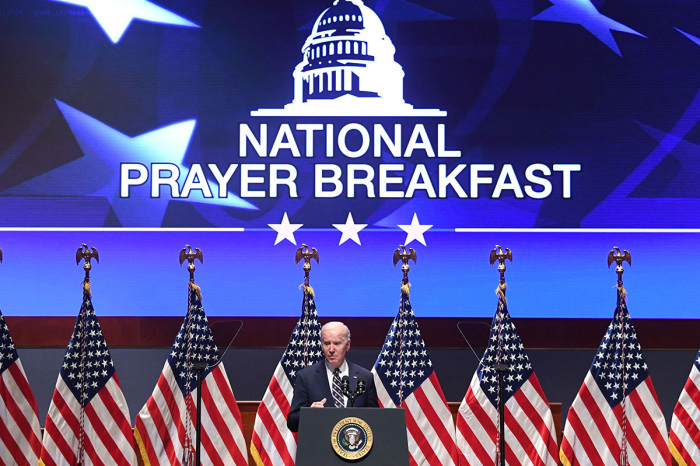Biden speaks of ‘new hope,’ ‘moment of renewal’ in National Day of Prayer Proclamation

President Joe Biden spoke of the United States having a “new hope” and “a moment of renewal” as the nation observes the National Day of Prayer.
In a proclamation issued the day before the observance, Biden explained that, on the Day of Prayer, “we recognize the healing power of prayer, especially as we recover from the trauma and loss of the COVID‑19 pandemic.”
“Today we find ourselves in a moment of renewal — of lives saved, of new jobs created, and of new hope for rebuilding America,” stated Biden.
The president said the day calls for “a moment of reflection when we are called to address some of the greatest challenges humanity has ever faced." He listed climate change, “attacks on democracy at home and abroad” and living up to national principles like justice, liberty and equality as examples.
“I call upon the citizens of our Nation to give thanks, in accordance with their own faiths and consciences, for our many freedoms and blessings, and I invite all people of faith to join me in asking for God’s continued guidance, mercy, and protection,” he continued.
Last year, Biden garnered controversy for his Day of Prayer proclamation, the first that he issued as president, due to the official statement omitting any direct mention of God.
“Joe Biden’s National Day of Prayer Proclamation has been released and it doesn’t even mention God once!” Christian Broadcasting Network Chief Political Correspondent David Brody commented on Twitter last year.
“How do you release a proclamation about prayer and not mention God at all? Of course it mentions climate change & racial justice. Truly, this is pathetic ... and not surprising.”
In contrast, former President Donald Trump’s 2020 proclamation directly mentioned God 11 times, while former President Barack Obama’s 2016 proclamation directly mentioned God twice.
Created in 1952 by an Act of Congress, the National Day of Prayer is held every year on the first Thursday in May and has had the official endorsement of presidents from both major parties.
In addition to the proclamation, the Day of Prayer often includes tens of thousands of local events across the U.S. aimed at praying for the nation's well-being.
The observance has not been without controversy, as some secular groups have argued that the proclamations violate the separation of church and state and thus should be discontinued.
At one point, the prominent atheist organization the Freedom From Religion Foundation filed suit against the Obama administration over the proclamation practice.
Although one judge ruled in the organization's favor in 2010, the decision was overturned in 2011 via a unanimous ruling from a three-judge panel of the U.S. Court of Appeals for the Seventh Circuit.
Seventh Circuit Chief Judge Frank Easterbrook authored the panel opinion, concluding that the FFRF lacked the standing to sue Obama over the prayer proclamation, stating that “hurt feelings differ from legal injury.”
“Plaintiffs have not altered their conduct one whit or incurred any cost in time or money. All they have is disagreement with the President’s action,” wrote Easterbrook. “But unless all limits on standing are to be abandoned, a feeling of alienation cannot suffice as injury in fact.”
Email: [email protected] Follow Michael Gryboski on Facebook: michael.gryboski Follow Michael Gryboski on Twitter: MichaelGryboskiCP




























